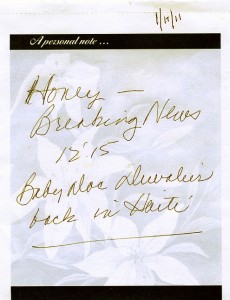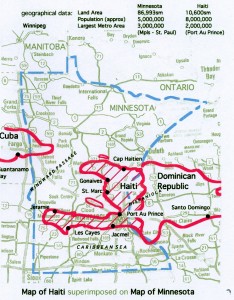#315 – Dick Bernard: Haiti. Duvalier. The Punishment and Justice Narrative…and the Reconciliation Possibility
I woke early in the morning of Martin Luther King Day, January 17, 2011. The purpose was to publish #314, which is here.
In front of me was a note from my spouse from a couple hours earlier. It deserves to be presented as I saw it:

On screen were a couple of e-mails about Duvalier’s return.
I added a few comments to the end of #314, and clicked publish. They remain “my first draft of history”, as I see it.
Off to morning coffee a little later, I noted that the January 17 Minneapolis Star Tribune, hardly a Haiti focused newspaper, gave the story front page status, and 27 column inches. In the news biz, that’s a major story.
Now the debate is raging, particularly within the community that has an interest in Haiti policy: Whose fault is this? What does it mean? What should be done? And on and on and on.
I keep thinking of Nelson Mandela, Desmond Tutu, Gandhi, Martin Luther King, Jean-Bertrand Aristide, Fr. Gerard Jean-Juste. Three are living, half are dead. Two of them were assassinated, most all of them were imprisoned or exiled. All were labeled by opposing persons and groups as, in one sense or another, enemies of the state, corrupt, even evil. It’s called political positioning….
And each had followers: people who believed in them; thought they were doing some good.
So did the Duvalier’s.
What would they all be saying? What will those still living have to say in coming hours and days?
I’m hardly an acknowledged ‘expert’ on Haiti, but I think I know a lot more than most, and I’ve made an effort to stay well informed over the years. The very short ‘course’: the Duvalier’s were cast as crooks and evil; Aristide has been cast as basically the same; Haiti has scarcely benefitted from hundreds of years of meddling from outside, in the most recent several hundred years primarily by France and the United States of America, neither of which had much time for a state of freed slaves.
Of the people I met in my first trip to Haiti, December, 2003, two have been murdered – one within two days of my meeting him; a couple were tossed in prison not long after on what were quite certainly trumped up charges; within three months most of the rest were in hiding or out of the country after the 2/29/2004 coup.
Quite inadvertently I got a University level introduction to what most never read in books or even hear in conversations.
Adding to the mix is the not always helpful role of what has been described as 10-16,000 independent NGO’s (non-governmental organizations) trying to do something in Haiti, from the micro to the macro – all this in a country one-eighth the size of my own state of Minnesota. Indeed I heard a U.S. embassy official recently describe Haiti as a Republic of NGO’s. This is not helpful to anyone, including the NGO’s, and most especially not helpful to the long-term for the Haitians themselves. We’ve all heard the term, “too many cooks in the kitchen”. Haiti has tens of thousands….

The purpose of this piece is to plea for some perspective, and for some consideration of positive possibilities in the wake of this news development.
Shortly, apparently today, in a few hours, Baby Doc will say something in Port-au-Prince and we’ll get his ‘spin’ on his return to his native land.
Personally, I keep thinking that this is a unique moment: a unique opportunity to begin a reconciliation process in a time of huge and continuing crisis. I remember Fr. Gerard Jean-Juste, supporter of President Aristide, in his beloved St. Clare’s parish in Port-au-Prince, preaching on Dec. 7, 2003 – less than 24 hours after I’d landed in his country. There were six white Americans in his pews that day, and I was one of them. Most of his sermon was in Kreyol, but part of it was in English, very powerfully directed specifically to us, and part of that message emphasized the paths which could be chosen: to be “killers” or “healers”….
Given the cacophony already, I’m not terribly hopeful about “healing” being in the Haiti conversation today….
But Martin Luther King, and Mandela and Gandhi and Jean-Juste could dream.
Why not?
